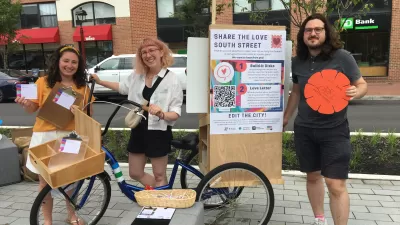Recently published research examines the "Role of Artificial Intelligence in Community Planning"—that is, the role of automated bots on social media in corrupting participatory planning processes.

New research published by the International Journal of Community Well-Being—written by Justin B. Hollander, Ruth Potts, Maxwell Hartt, and Miny Situ—examines the potential roles and risk of automated social media accounts to influence the community engagement components of planning processes.
Inherent to this investigation is an awareness of the growing awareness of land use development issues, as enabled by the Internet and its many social media platforms. As has been well documented with regard to issues of national and presidential politics, automated social media profiles can be deployed to corrupt the public discourse.
"Due to the low cost and high potential engagement, planners and policymakers have been quick to open electronic channels of participation to inform the decision-making process. Doing so has created an opportunity for subversion from groups with alternate and possibly nefarious interests," reads the abstract for the research.
In the process of reviewing the relevant literature, the paper reveals comes key terminology that defines the strategies of social bots (e.g., astroturfing, spamming, and Twitter bombs) that might be helpful in diagnosing the behavior and tenor of online accounts. Eventually the paper offers a list of mitigation strategies to help planners ensure that social bots don't overwhelm the public trust in planning processes.
The entire paper is available online via Springer.
FULL STORY: The Role of Artificial Intelligence in Community Planning

Trump Administration Could Effectively End Housing Voucher Program
Federal officials are eyeing major cuts to the Section 8 program that helps millions of low-income households pay rent.

Planetizen Federal Action Tracker
A weekly monitor of how Trump’s orders and actions are impacting planners and planning in America.

Ken Jennings Launches Transit Web Series
The Jeopardy champ wants you to ride public transit.

California Invests Additional $5M in Electric School Buses
The state wants to electrify all of its school bus fleets by 2035.

Austin Launches $2M Homelessness Prevention Fund
A new grant program from the city’s Homeless Strategy Office will fund rental assistance and supportive services.

Alabama School Forestry Initiative Brings Trees to Schoolyards
Trees can improve physical and mental health for students and commnity members.
Urban Design for Planners 1: Software Tools
This six-course series explores essential urban design concepts using open source software and equips planners with the tools they need to participate fully in the urban design process.
Planning for Universal Design
Learn the tools for implementing Universal Design in planning regulations.
Ada County Highway District
Clanton & Associates, Inc.
Jessamine County Fiscal Court
Institute for Housing and Urban Development Studies (IHS)
City of Grandview
Harvard GSD Executive Education
Toledo-Lucas County Plan Commissions
Salt Lake City
NYU Wagner Graduate School of Public Service





























